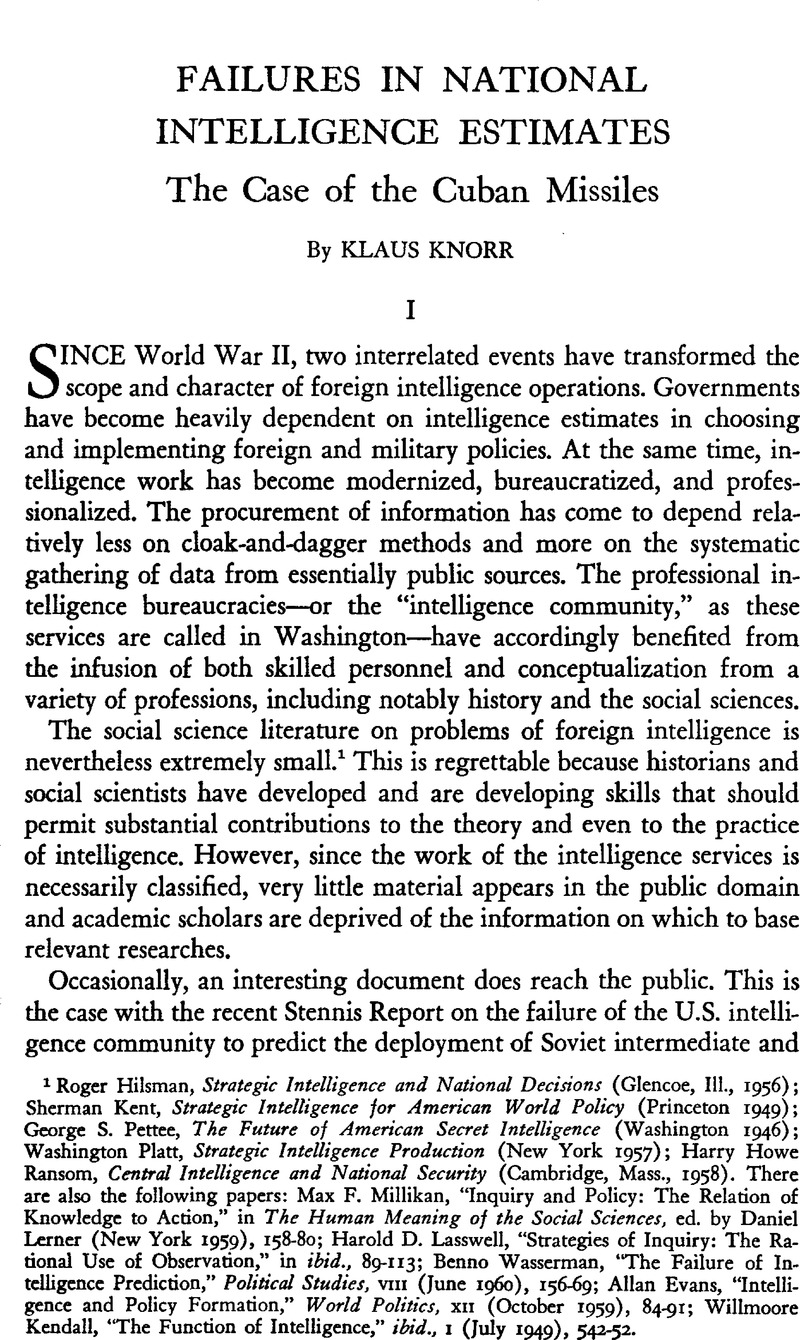Published online by Cambridge University Press: 18 July 2011

1 Hilsman, Roger, Strategic Intelligence and National Decisions (Glencoe, Ill., 1956)Google Scholar; Kent, Sherman, Strategic Intelligence for American World Policy (Princeton 1949)Google Scholar; Pettee, George S., The Future of American Secret Intelligence (Washington 1946)Google Scholar; Platt, Washington, Strategic Intelligence Production (New York 1957)Google Scholar; Ransom, Harry Howe, Central Intelligence and National Security (Cambridge, Mass., 1958)Google Scholar. There are also the following papers: Millikan, Max F., “Inquiry and Policy: The Relation of Knowledge to Action,” in The Human Meaning of the Social Sciences, ed. by Lerner, Daniel (New York 1959), 158–80Google Scholar; Harold D. Lasswell, “Strategies of Inquiry: The Rational Use of Observation,” in ibid., 89–113; Wasserman, Benno, “The Failure of Intelligence Prediction,” Political Studies, VIII (June 1960), 156–69CrossRefGoogle Scholar; Evans, Allan, “Intelligence and Policy Formation,” World Politics, XII (October 1959), 84–91CrossRefGoogle Scholar; Willmoore Kendall, “The Function of Intelligence,” ibid., 1 (July 1949), 542–52.
2 Investigation of the Preparedness Program, Interim Report on the Cuban Military Buildup by the Preparedness Investigating Subcommittee, Committee on Armed Services, U.S. Senate, 88th Congress, 1st Session (Washington 1963). The Report is usually called the Stennis Report because Senator Stennis was chairman of the subcommittee.
3 Ibid., 10.
4 Ibid., 7.
5 Ibid., 5; cf. also 10.
6 Ibid., 2; italics added.
7 Ibid., 11.
8 Ibid.
9 In the following, I am referring to Wohlstetter, Roberta, Pearl Harbor: Warning and Decision (Stanford 1962)Google Scholar. This book is an excellent addition to the literature on intelligence.
10 Ibid., 390, 392.
11 Ibid., 56.
12 Ibid., 390, 397.
13 Ibid., 393.
14 Ibid., 349.
15 Ibid., 397.
16 Cf. Fagen, Richard R., “Calculation and Emotion in Foreign Policy: The Cuban Case,” Journal of Conflict Resolution, VI (September 1962), 214fCrossRefGoogle Scholar.
17 Cf. Verba, Sidney, “Assumptions of Rationality and Non-Rationality in Models of the International System,” World Politics, XIV (October 1961), 93–117CrossRefGoogle Scholar.
18 Wohlstetter, 395.
19 Cf. Singer, J. David, “Inter-Nation Influence: A Formal Model,” American Political Science Review, LVII (June 1963), 426Google Scholar.
20 Wohlstetter, 337f.
21 There is some evidence suggesting that the surprise achieved by Japan at Pearl Harbor owed something to an irrational disregard by Japanese planners of the decided U.S. superiority in war potential. Cf. ibid., 350ff.
* Editor's Note: Arnold L. Horelick presents a detailed analysis of the probable nature of Soviet calculations in “The Cuban Missile Crisis,” the first article in this issue of World Politics.